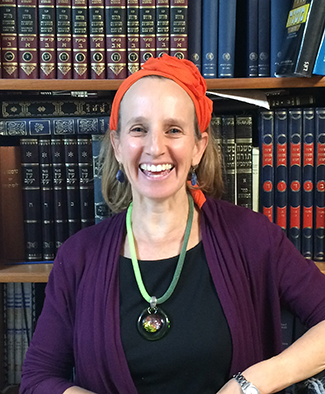Being Jewish
Personality
Interview with Rabbi Meesh Hammer-Kossoy

Rabbi Meesh Hammer-Kossoy, 48, teaches Talmud at the nondenominational Pardes Institute of Jewish Studies in Jerusalem, where she leads the social justice track. Before she became one of Israel’s first female Orthodox rabbis in 2015, she was “a pretty standard Orthodox girl,” she says, but then corrects herself: “Maybe not really standard.” A life member of Hadassah, she grew up in what she calls an “assimilated Conservative family” in Silver Spring, Md., and Fairfax, Va. She has a bachelor’s degree in Near Eastern studies from Brandeis University and a master’s and doctorate in Talmud from New York University. She lives in Jerusalem with her husband and three children and is a member of Kehillat Yedidya, a liberal Orthodox synagogue that has been in the forefront of expanding religious roles for women. This interview has been edited for brevity and clarity.
Why did you want to become a rabbi and what was the process like?
First of all, I got a 10 percent raise from Pardes once I got the title “rabbi”! But more than that, why shouldn’t I have the same authority that my male colleagues have? The main reason I wanted to do it was because the doors of learning halacha (Jewish law) became open to women, and I was very happy to learn the Torah. I got ordination from Rabbi Herzl Hefter and Rabbi Daniel Sperber at Beit Midrash Har’el in Jerusalem, which is a small, Orthodox co-ed institution that ordains both men and women. The ordination was based on two tests I took and my 26 years of learning and teaching.
Is your ordination recognized by Israel’s rabbinic authorities?
No. My ordination follows a pattern of private ordinations that has existed for at least a thousand years before the creation of the State of Israel. The government does not recognize any private ordinations. Beit Midrash Har’el is the first Orthodox institution that has given women ordination that is exactly equivalent to that of men in terms of their authority. That means I can give halachic rulings and, if I wanted, I could be a pulpit rabbi.
Why is it important to use “rabbi” as a title and how have people responded to that designation?
It’s not so important to me to use the title. If I go into a synagogue where women rabbis are not accepted and they introduce me as Dr. Meesh Hammer-Kossoy, I’m fine with that. I am also happy to use the title. My friends have been very supportive, and with my neighbors, who are more diverse, it’s been more mixed. I would describe it as shock tinged with excitement.
Have you become more strict in your Jewish practice since you were ordained?
I am interested in being part of the Orthodox establishment and I’m aware that I’ve taken this relatively radical step of using the title “rabbi,” and the responsibility that comes with that. I’m aware that people are watching me more than they were before. If someone sees me talking in shul, they will say, “Look, the rabbi’s doing it. It must be O.K.,” so I need to be more careful about that.
In addition to teaching, how have you been involved in the issue of African asylum seekers in Israel?
I have protested and worked with groups of clergy to organize letters of protest to the government. I also published resources for rabbis to encourage them to teach on this issue. I am part of a rabbinic and activist group that is asking families to “adopt” hundreds of asylum seekers who came to Israel alone as minors and have no legal status even though they’ve been here for years. I teach a lot about the risks that Abraham and Moses took, that part of doing the right thing is being willing to take risks. I’m trying to get people to bridge the world of Torah and the real world. The rabbis themselves say that Torah learning should lead to deeds.
Linda Gradstein is a freelance journalist based in Jerusalem and teaches journalism at New York University-Tel Aviv.









 Facebook
Facebook Instagram
Instagram Twitter
Twitter
Moe G. says
Although Orthodox Judaism has been at the forefront of respect and honor for women for thousand’s of years before the “enlightened” Western world, they do not recognize woman Rabbis. Beit Midrash Har’el is not going along Orthodox guidelines, but rather Reform or Conservative ones.